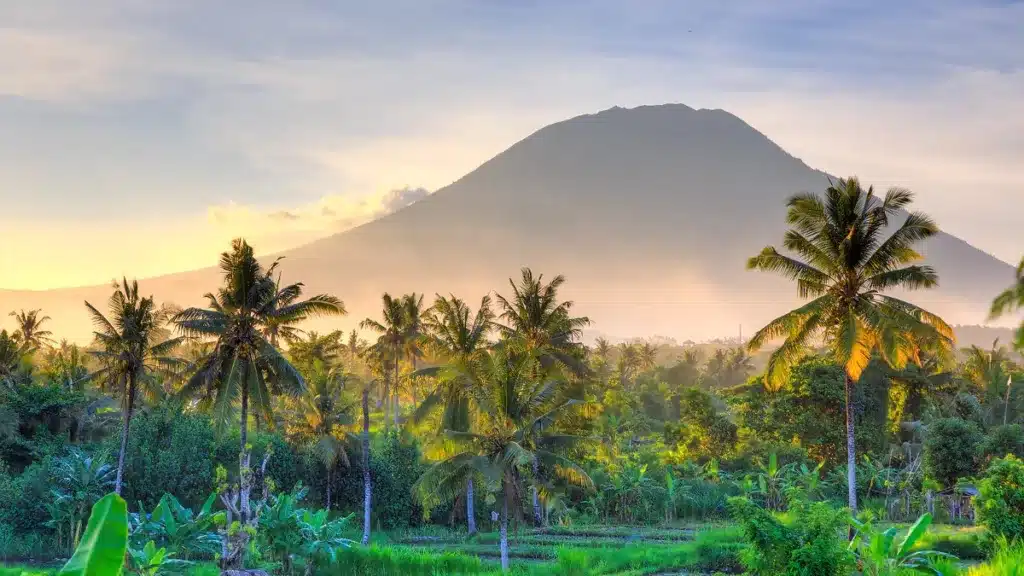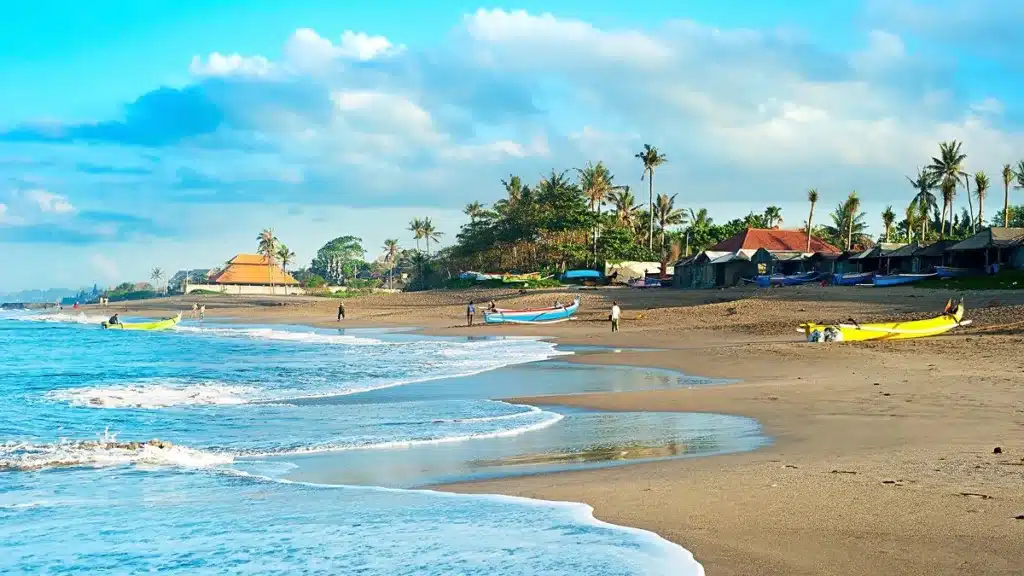About Nyepi Day
Bali’s Nyepi Day stands apart as a beacon of tranquillity and introspection in the kaleidoscope of global New Year celebrations.
Unlike the fireworks and fanfare synonymous with New Year’s around the world, Nyepi, the Balinese New Year, invites the island’s inhabitants and visitors to a day of complete silence, stillness, and self-reflection.
This article delves into Nyepi’s spiritual and cultural facets, offering a glimpse into its mystical allure and how it captivates the heart of anyone fortunate enough to experience it.
Key Aspects of Nyepi Day
| Aspect | Description |
|---|---|
| Date | March 11th, 2024 |
| Eve | Ogoh-Ogoh Parade on March 10th, 2024 |
| Practices | – Amati Geni: No fire or light<br>- Amati Karya: No work<br>- Amati Lelunganan: No travel<br>- Amati Lelanguan: No entertainment |
| Observance | 24-hour period from 6 a.m. March 11th to 6 a.m. March 12th |
| Impact | All activities halt; silence across Bali |
| Significance | Spiritual renewal, purification, and reflection |
| For Visitors | Participation in silence, minimal hotel services, no outside activities |
Observations and Practices
Dates: Nyepi on March 11th, 2024; Ogoh-Ogoh Parade on March 10th, 2024.
Silence Duration: Complete silence for 24 hours from 6 a.m. March 11th to 6 a.m. March 12th.
Activities Prohibited:
- No fire or electricity (Amati Geni).
- No work or business activities (Amati Karya).
- No travelling (Amati Lelunganan).
- No entertainment or loud festivities (Amati Lelanguan).
Enforcement: Local guards ensure observance; essential services like hospitals remain open.
Impact on Transportation: Closure of airports, bus terminals, and harbours.
Visitor Guidelines: Stay indoors, minimise noise, and adhere to hotel guidelines.
Cultural Significance: Reflection, purification, and setting positive intentions.
Experiencing Nyepi as a Visitor
| Pros | Cons |
|---|---|
| Unique Cultural Experience: Witnessing Nyepi offers insight into Balinese spirituality and traditions. | Restricted Movement: Visitors must remain in their accommodations, limiting exploration. |
| Personal Reflection: The enforced silence provides a rare opportunity for introspection and meditation. | Limited Services: With businesses closed, access to food, entertainment, and other services is restricted. |
| Environmental Impact: A day without vehicles and lights significantly reduces carbon footprint and pollution. | Potential Isolation: Those unprepared for the silence might feel isolated or bored. |
| Forced Digital Detox: The absence of electronic entertainment encourages personal interaction and relaxation. | Adjustment Challenges: Adapting to the strict rules and silence can be challenging for some, especially first-timers. |
The Essence of Nyepi
Marking the turn of the Saka calendar, Nyepi is the crescendo of a series of rituals aimed at cleansing Bali’s spiritual and physical space. It is a day when the island, known for its vibrant culture and picturesque landscapes, turns inward in a profound act of collective meditation and renewal.
The silence and inactivity are believed to cleanse the world of the previous year’s impurities and reset the spiritual and natural order.
The Ogoh-Ogoh Parade
The Nyepi festivities commence on the evening of March 10th, 2024, with the Ogoh-Ogoh parade. This vibrant and energetic event starkly contrasts the silent day that follows.
Huge, intricately crafted effigies representing demonic spirits parade through the streets, accompanied by the pulsating rhythms of gamelan music.
The parade symbolises the riddance of negative energies, preparing the island for the sanctity of Nyepi.
24 Hours of Silence

From 6 a.m. on March 11th to 6 a.m. the following day, Bali observes a strict protocol of silence (Amati Geni), cessation of all work (Amati Karya), no travel (Amati Lelunganan), and abstention from self-entertainment (Amati Lelanguan).
Even tourists are encouraged to participate, with local authorities and community leaders (Pecalang) ensuring the observance of these practices.
The silence extends to the closure of businesses, the airport, and the dimming of lights, creating a palpable sense of peace across the island.
The Spiritual Significance of Nyepi
Nyepi is a time for self-reflection, meditation, and renewal. It offers a moment to pause and look inward, setting intentions for the year ahead.
This practice aligns with the Balinese belief in harmony between the spiritual and material worlds, emphasising the importance of balance and self-purification.
Experiencing Nyepi as a Visitor
Nyepi presents a rare opportunity for visitors to witness Bali’s deep cultural and spiritual traditions.
While the restrictions might seem daunting, many find the experience incredibly rewarding.
Hotels accommodate guests with minimal services, ensuring a comfortable stay while respecting the day’s observances.
It’s a chance to disconnect from the hustle of everyday life and reconnect with oneself in the serene ambience of Bali.
Conclusion
Nyepi exemplifies the unique cultural identity of Bali, offering a profound lesson in mindfulness and environmental consciousness.
In today’s fast-paced world, the day of silence serves as a reminder of the value of quietude, introspection, and communal respect for nature and the divine.
Whether you’re a resident or a visitor, Nyepi offers a moment of unparalleled peace and reflection, truly a New Year celebration like no other.
Mount Agung
Mount Agung: The Majestic Volcano in Bali, Indonesia Mount Agung, an awe-inspiring volcano located in…
Splash Water Park Bali
Splash Water Park Bali: A Family-Friendly Adventure Embark on an unforgettable journey of excitement, fun,…
Canggu Beach
Nestled just north of Seminyak, Canggu Beach offers a striking contrast of deep black sands…
Finns Beach Club Bali
The FINNS Beach Club Bali brand is well-known for providing the best beach club experience…
Tegalalang Rice Terrace
The Mesmerizing Tagalang Rice Terrace The Tegalalang Rice Terrace in Ubud, Bali, is renowned for…
Bali Treetop Adventure Park
An Exciting Adventure in the Trees Visitors who enjoy a challenge and the great outdoors…
FAQ
Nyepi Day, observed in Bali, marks a period of complete silence, commencing on Monday, March 11, at 6 a.m. and concluding on Tuesday, March 12, at the same hour. During this time, all individuals on the island are required to stay indoors, extinguish all lights, and maintain silence, effectively pausing all external activities.
Nyepi Day celebrates the Balinese New Year based on their calendar. In 2024, Nyepi falls on Monday, March 11, beginning a 24-hour observance from 6 a.m. that continues until 6 a.m. the following day.
On Nyepi Day, the entire island shuts down, including the Hindu Balinese, who stay at home without speaking, answering phones, or entertaining guests. No lights or motor activity is allowed, ensuring the island remains undisturbed.
Nyepi Day enforces four primary prohibitions: no pleasure (amati lelangon), no traffic (amati lelungan), no fire (amati geni), and no work (amati karya). These rules underscore the day’s significance, focusing on reflection and renewal.
During Nyepi, it’s important to avoid loud talking or creating disturbances. All shopping for necessities should be done beforehand, as going out or accessing closed shops and markets is not permitted.
Swimming is allowed in private villa pools during Nyepi, but outdoor lighting should be minimized after dark, with curtains drawn to conceal indoor lighting.
Eating and drinking are restricted during Nyepi, aligning with the day’s focus on self-reflection and respect for the observance. Preparing food in advance is recommended due to restrictions on cooking and lighting.
Smoking, as part of the no fire (Amati Geni) prohibition, is not allowed during Nyepi. Preparations include consuming only what can be stored in thermoses and eating special pre-made dishes.
Enjoying Nyepi involves planning ahead: ensure your stay aligns with Nyepi observances, stock up on essentials, and consider indulging in activities like spa treatments or stargazing to appreciate the tranquillity and lack of light pollution.
Bali’s airport, along with all businesses and roads, closes for 24 hours during Nyepi. Planning travel around these dates is crucial to avoid disruptions.
Electricity use is significantly reduced to a minimum during Nyepi, emphasizing the day’s observance of silence and reflection.
While most shops and restaurants close, hotel restaurants may remain open, particularly those within resort properties, albeit with subdued lighting.
Nyepi is a day for self-reflection, adhering to the Catur Brata Penyepian rituals: no fire, no travel, no activity, and no entertainment, fostering a serene environment for meditation and prayer.
For non-Hindu residents and visitors, Nyepi is a day for quiet relaxation at home or in hotel accommodations, respecting the solemnity of the observance.
Traditional foods like Entil, Pulung Nyepi, and Jaja Apem are prepared in advance to be consumed during the observance, reflecting the day’s dietary customs.
Nyepi mandates adherence to Catur Brata, emphasizing restrictions on fire, work, pleasure, and travel, fostering a day dedicated to spiritual cleansing and renewal.
Yes, Nyepi is a unique Day of Silence observed only in Bali, marking a significant public holiday with profound cultural and religious significance.
Due to the restrictions on electricity and activities, wifi access is usually unavailable during Nyepi, supporting the day’s observance of silence and reflection.
Following Nyepi, celebrations continue, marking the Balinese New Year with community rituals like the Omed-omedan or ‘The Kissing Ritual,’ symbolizing the beginning of a new cycle.
Except for emergency services, all commercial establishments remain closed during Nyepi, including restaurants and shops, contributing to the island’s observance of silence.
The Gili Islands, along with Lombok, do not observe Nyepi, offering alternatives for those wishing to experience the holiday period differently.
The day before Nyepi, known as Ngrupuk, involves community parades with ogoh-ogoh (demon effigies) to cleanse the island of evil spirits, showcasing Balinese creativity and communal spirit.
Preparation involves stocking up on essentials and planning for a day of introspection without the usual conveniences, ensuring a respectful observation of Nyepi’s sanctity.
Nyepi’s observance begins and ends at 6 a.m., spanning a full 24 hours dedicated to silence, reflection, and renewal.
The parades of ogoh-ogoh are best viewed in major towns like Kuta, Seminyak, Nusa Dua, and Sanur, where communities compete in crafting these magnificent effigies, enhancing the festive atmosphere.
Walking outside or engaging in usual activities is strictly prohibited during Nyepi, reflecting the day’s focus on stillness and introspection.
Attempting to venture outside during Nyepi may lead to intervention by local watchmen (pecalang), enforcing the day’s observance and maintaining the sanctity of the silence.
Beaches, like all outdoor spaces, remain deserted during Nyepi, underscoring the island-wide commitment to a day of absolute quiet and reflection.







